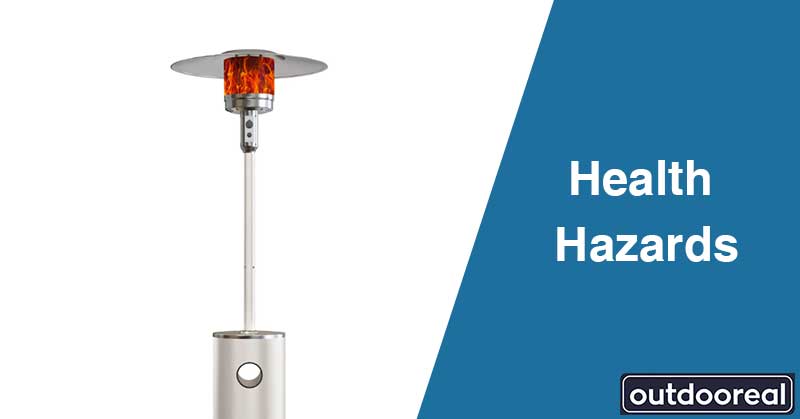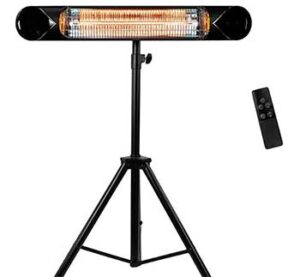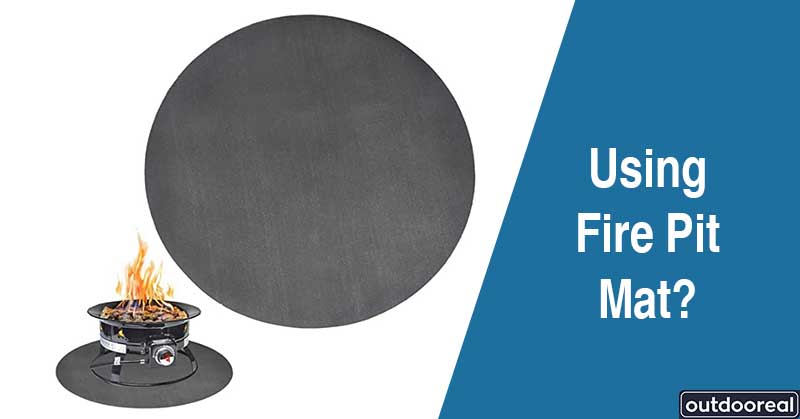Whether you use a gas or electric heater, patio heaters can only be safe if safety guides are appropriately followed. Suppose you like to host guests or enjoy with family members in the backyard. In that case, you will check for ventilation, leakage, health issues, regular maintenance, and other safety precautions with the patio heater. In this article, along with state guidelines, you will find all the possible health issues and other hazards from patio heaters and safety guides to prevent them.

Is Patio Heater Harmful for Health?
Yes, propane or natural gas patio heaters can cause several health hazards for people enjoying the heat. Gas patio heaters, whether gas or propane, will always produce carbon monoxide, nitric oxide, and nitrogen dioxide. Carbon monoxide and the other two are considered toxic gases. These poisonous gases are harmful to one’s health and can also aggravate asthma and other respiratory diseases. Furthermore, inhaling carbon monoxide in large amounts can cause death, nausea, etc.
However, an electric patio heater has no known health risks, as it does not produce any smoke or toxic gases. Therefore, it is often considered safer for humans.
Does Patio Heater Produce Carbon Monoxide?
Unlike electric patio heaters, gas patio heaters produce carbon monoxide. Patio heaters that use combustion emit toxic gases that can cause various diseases, including allergies. Any carbon-containing material that burns inefficiently releases CO, a poisonous, invisible gas. CO-poisoned victims remain unaware of the danger since they cannot see or smell the gas.
CO hinders the oxygen supply to the brain, making it malfunction. The severity of CO poisoning depends on the exposure level and duration and the individual. Dizziness, nausea, breathlessness, chest pain, and a loss of coordination are some symptoms of carbon monoxide poisoning. At the most significant CO concentrations, these effects can cause collapse, coma, and death because they worsen the longer you are exposed to them.
Can I Use My Patio Heater in Covered Places?
It would be best if you never used any open flame or gas patio heater in covered places, such as a gazebo, pergola, balcony, tent, or covered porch. Flame-producing patio heaters can be hazardous inside covered porches, as they have toxic gases and can cause carbon monoxide poisoning. In addition, if you fail to shut off the gas heater while using it in a protected place and fall asleep, apart from causing respiratory diseases or difficulty in breathing, it can cause death.
Does Patio Heater Need Ventilation?
According to NFPA® 1 Fire Code, patio heaters should have at least three feet of clearance from all flammable items. Also, the regulation states propane or gas patio heaters must be used outdoors in well-ventilated places as they produce flame and smoke; using them in a well-ventilated area rather than covered spots is mandatory. The ventilated space is required according to the BTUs of your heater. For example, if the BTU amount exceeds 40,000 BTU, you will need twice the usual amount of ventilated area.
However, you can use electric patio heaters under 2000 watts in a garage, gazebo, pergola, parasol, or covered porches. But be aware of overheating incidents.

Is an infrared patio Heater Harmful to the skin?
No, an infrared patio heater does not cause any harm, nor is it detrimental to the skin or eye. As the infrared heating system works with far rays, infrared type C will not radiate any beam to create any problem for the skin. In addition, Infrared patio heaters do not produce smoke or harmful poisonous substances, making them ideal for living with a patio heater.
Can Electric Patio Heaters Cause Fire Hazard?
According to the consumer product safety commission, USA, about 21,800 residential fire is caused due to heaters. Despite being safe for health, electric patio heaters can also cause an unprecedented blaze. If the patio heater is connected to a faulty socket or put too close to curtains or paper items, the possibility of catching fire increases. Below are some options for which the heater may cause a fire accident;
- a) Faulty Electrical Connection: If the electricity line itself is faulty and suffers from continuous voltage up-down problems, not only the electric heater line will catch fire, but also it may break, blast, or burn down the whole house.
- b) Overheat: We often put on the switches and forget about the heater’s overheating issue; some even fall asleep, leaving the electric heater on. However, if the heater has no overheating protection, the house will be overheated and cause fire on its own.
c) Keeping flammable items nearby: Even if it’s an electric patio heater, you must maintain a safety clearance of at least three feet from any flammable objects. Placing the heater beside curtains, papers, books, or wooden furniture will cause direct heat and eventually start a fire.
Possible Health Hazards Caused by Patio Heaters
Research organizations have claimed that gas patio heaters pollute the environment significantly and pose several health threats. Propane or gas patio heaters are mainly hydrocarbons, which produce nitrogen dioxide, carbon monoxide, and nitrogen oxide as by-products of the burning. Here are some possible health hazards from different toxic gases that are made from the gas patio heaters;
Carbon Monoxide health hazards:
Carbon monoxide has no color and no smell. People can faint or even pass out when there are high quantities of carbon monoxide in the air. Other than poisoning, long-term low-level cO inhalation is also dangerous and can cause loss of coordination. Here are some possible health issues and symptoms due to carbon monoxide poisoning;
- Nausea
- Headache
- Dizziness
- Weakness
- Chest pain
- Collapse
- Coma
Nitrogen dioxide and Nitrogen Oxide health hazards:
NO2 and NO can be dangerous if breathed during gas patio heater burning. NO and NO2 can cause;
- Lung diseases
- Swollen air tracts
- Shorten life spans
8 Safety Tips to be Safe While Using Patio Heater
If you want your kids, pets, family members, or guests to be safe and comfortable on the outdoors or patio, you should pay attention to the safety tips below:
1. Use the gas patio heaters outdoors and in a well-ventilated place:
According to Technical standards and the safety authority(TSSA), you should never use gas patio heaters indoors or in covered places. Remove the cylinder if you need to store the patio heater indoors. If a gas patio heater is used indoors, it can cause carbon monoxide poisoning, which will not only cause colossal health damage but also can lead to death.
2. Place the patio heater in the correct place:
Before placing the heater, look around and measure the safety clearances. You should put three feet of safety distance all around the heater. Do not place it near flammable substances or under any tree directly. While positioning, follow the manufacturer’s instructions carefully to avoid any fire risk.
3. Store the gas cylinders outside:
Never store the gas cylinders inside or near any exit. Instead, please keep them in a stable outdoor caged place. Ensure there’s no chance for the cylinder to tip over or fall. According to NFPA® 1 Fire Code, cylinders must be stored in an area with the minimum potential for physical damage in the fire.
4. Move the patio heater with care:
Do not move any patio heater when lit or hot; it may cause severe burns or other significant issues. When moving electric patio heaters, unplug them. Overall, wait for at least.
5. Place the patio heater in a level, smooth place:
According to California state fire code, the authority recommends you buy a patio heater that comes with the auto shut-off of the system while tilted or tipped over. If tipped over or listed gas patio heater can cause fire disasters and hurt people or pets. So, it’s best to buy an auto-shut safety-equipped patio heater and place it in an even, leveled, and smooth place.
6. Never use any patio heater under rain or snow; use a cover:
You might think that patio heaters are built to endure a little rain or snow, and your idea is correct. However, a little water may slip inside the patio heater, which may cause the heater to malfunction. Other than the rain or snow, dust or insect can significantly harm the patio heater. So, it’s best to use a cover, whether an electric or gas patio heater.
7. Maintain and clean the heater regularly:
Whether you use an electric patio heater or a gas, if you want it to have a long lifespan, clean and maintain it regularly, according to different state fire codes; checking the gas connections and leaks is mandatory.
8. Consider buying a Carbon Monoxide alarm
If you use a propane or gas patio heater, buy a carbon monoxide alarm for domestic safety. CO alarm helps you to know when the air carbon monoxide level has crossed the danger limit. While buying, check for European standard certifications with visual and audible features.
Summary
Finally, if you are considering the safety and comfort of your loved ones and yourself, consider buying patio heaters that the CSA approves. And always remember to follow the manufacturer’s instructions for a perfect experience and a safe journey with the patio heater. However, electric patio heaters can be a safer option when considered with their alternatives. It does not produce any smoke, nor is it harmful to health.






